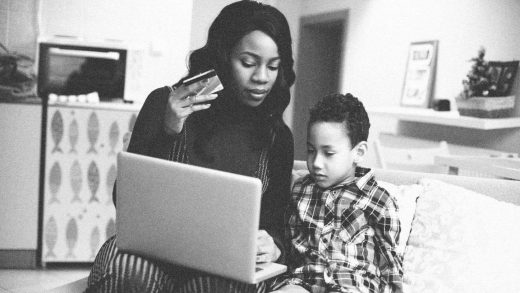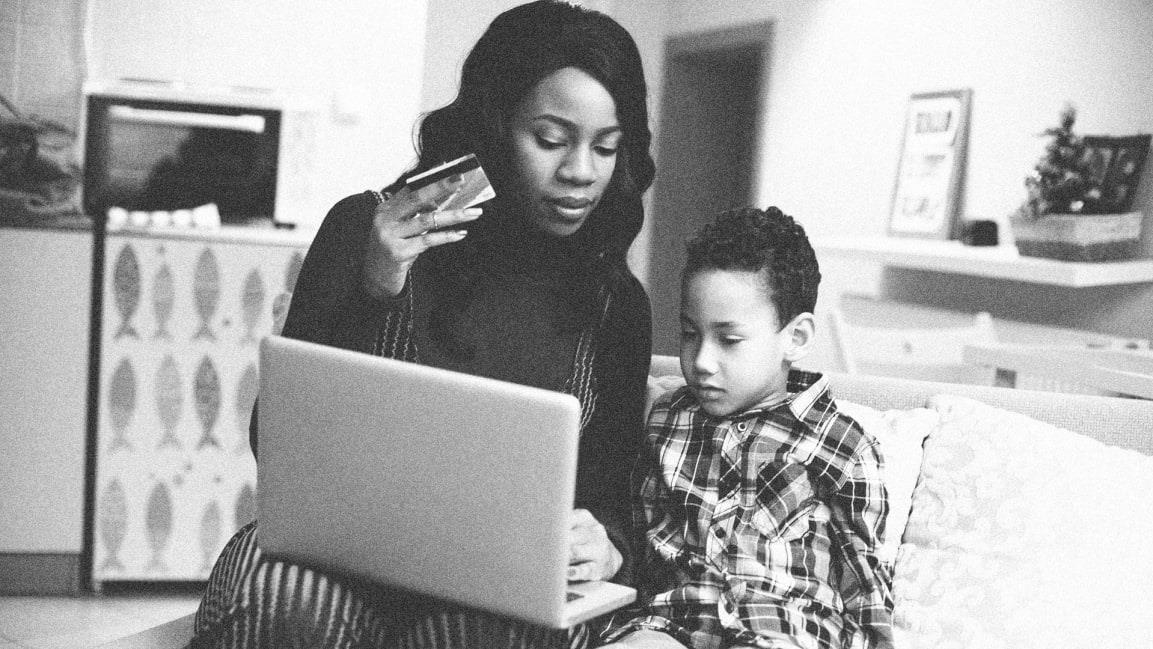The economic insecurity of Black breadwinner moms affects us all
Almost four years ago, my children’s elementary school was tagged with hate graffiti. We chose to send our children to this particular school because it has a newcomer center that supports immigrant and refugee children and their families entering the U.S. This is important to me because nearly six decades ago, my sisters were those newcomer children.
As the daughter and sister of refugees, I am well aware that the privileges I enjoy today are credited to someone in a position of power who said, “Not on my watch.” I’m also aware that I face bias because of my gender, yet I am privileged because I am white.
This privilege, however, does not foster guilt. It fosters responsibility. While I will never experience what it’s like to be a Black woman in America, I have a responsibility to use my privilege and platform as a gender economist and breadwinner mom to take action. It’s in this vein, and in light of current racial-justice events, that I want to shed light on the state of Black breadwinner moms in America. That’s why I’m calling on my fellow white sisters and brothers to summon our collective sense of responsibility to take a stand (and take action) for racial justice.
The state of Black breadwinner moms in America
I’m a breadwinner mom who fought to be paid equitably twice and won. I know firsthand the fear of speaking up—that in doing so, I put my and my family’s economic security at risk. Two years ago, with this perspective and experience, I directed my company to spearhead research about the state of breadwinner moms in America through the lens of intersectionality. The results are just as stunning and relevant today.
There are 16 million breadwinner moms in the U.S., and they support 28 million children. Of these 28 million children, 8 million (or 29%) belong to households with Black breadwinner moms.
Black breadwinner moms have the largest gender pay gap of any cohort of women in the U.S. Black breadwinner moms earn:
The income for households with Black breadwinner dads is nearly two times that of Black breadwinner moms. That means Black breadwinner moms must work almost an entire extra year to earn the same amount as Black breadwinner dads.
For comparison, a white breadwinning dad’s household income is 1.4 times that of a white breadwinning mom’s household income. The gender gap is even smaller among Asians, where breadwinning dads make 1.1 times that of breadwinning moms.
If you are a Black child in America, you are more likely to grow up in a breadwinner mom household than not. Since 1982, more than 51% of all Black American households with children under the age of 18 have been headed by breadwinner moms. Within this 51%, 37 percentage points represent households where the mom is the sole breadwinner. Any idea what the median household income is for Black moms who are the sole breadwinners? $30,000.
The consequences of Black breadwinner mom pay inequity
I have written extensively about how the gender pay gap cuts straight through the U.S. economy, and I published a report on how gender inequity manifests in almost every election issue. Let’s examine how one issue, criminal justice, intersects with gender pay inequity and the greater economy.
We have a separation crisis happening within our borders. It’s called the gender jail gap, and it strikes mothers of color the hardest. In 2018, our nation jailed enough mothers to replace the entire population of Houston. Of the 2,879,000 women who were put in prison that year, 80% were mothers—many of whom were solely responsible for their young children. And these mothers were disproportionately Black.
To explain the separation crisis, we need to consider the effects of the gender pay gap. When women, particularly Black mothers, are paid inequitably, they have fewer resources to make bail if they face this situation. Fewer resources to make bail means more women (Black mothers) are behind bars before ever receiving a fair trial.
We can do better with our tax dollars. Instead of investing resources to maintain a vast prison system—estimated to cost between $63 billion and $75 billion per year—we could invest resources to close the gender pay gap. Doing so would provide a $512 billion return for our nation. This, in turn, would cut the poverty rate for working single mothers nearly in half (from 28.9% to 14.5%) and improve the economic, social, and physical well-being for the 28 million children who depend on moms’ income.
If you care about something, then do something
Words are not a substitute for taking action. They are a catalyst for it. Sometimes, we want to help but don’t know how. Or we worry that if we help, it won’t make a “real” impact. Other times, we are afraid that our actions might be misconstrued.
When my children’s school was tagged with hate graffiti, I wasn’t interested in pointing fingers. I was interested in coming together. We formed the Brave Coalition to foster inclusion and safety for our children. It encouraged community members to walk the walk despite these fears, doubts, and reservations. It also encouraged them to channel outrage and solidarity into action. To not only rumble like thunder but to strike like lightning as well.
The gender jail gap is just one way that pay inequity holds back our economy. There are many others, and we cannot stay ignorant or silent on these injustices any longer. George Floyd’s death. Christian Cooper’s experience in the park. COVID-19 exposing the cracks in our system.
We have a decision to make at this moment in history. Racism is no more a “Black persons’ issue” than gender equity is a “women’s issue.”
We must heed President Lincoln’s rallying cry and appeal to the better angels of our nature. This is about who we are as a nation, as a country. We are now almost 244 years into the great experiment of American democracy. Will we choose to preserve the light, or will we extinguish it? We will decide the next step of this great experiment. What will we choose? What will you choose?
Katica Roy is the CEO and founder of Pipeline Equity.
(37)



